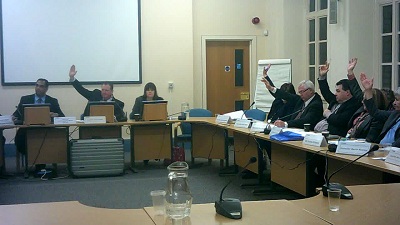Public meetings for Wirral Council, Liverpool City Region Combined Authority & a meeting on Chief Officer’s pay

Left to right newly elected Mayor of Wirral Councillor Steve Foulkes and former Mayor of Wirral Councillor Dave Mitchell at the Annual Meeting of Wirral Borough Council on 2nd June 2014
Below is a list of upcoming public meetings & other matters involving local government happening this week. Most are local, but the House of Common’s Communities and Local Government Select Committee on Chief Officer’s pay in local government should be available to watch live on Parliament’s website.
=======================================================================================================
Date: Monday 9th June 2014
Time: 4.15pm
Public Body/Committee: House of Commons
Venue: The Thatcher Room, Portcullis House
Type of meeting: Communities and Local Government Select Committee
Subject: Operation of the National Planning Policy Framework
Witnesses – Richard Blyth (Royal Town Planning Institute),
David Henry (Royal Institution of Chartered Surveyors),
Councillor Tony Newman (Local Government Association),
Councillor Gillian Brown (District Councils’ Network),
Mike Kiely (President of the Planning Officers Society) and
Councillor Ken Browse, (Chairman, National Association of Local Councils)
=======================================================================================================
Date: Monday 9th June 2014
Time: 6.15pm
Public Body/Committee: Wirral Council
Venue: Council Chamber, Wallasey Town Hall, Brighton Street, Wallasey, CH44 8ED
Type of meeting: Annual Meeting of the Council Part 2
This continues from the Annual Meeting of the Council part 1 which was adjourned the previous week.
The agenda is items 6-12 and the reports pack and supplementary can be downloaded from Wirral Council’s website.
6. Declarations of Interest
7. Civic Mayor’s Announcements
8. Petitions
9. Minutes (10th March 2014)
10. Election Results – 22 May 2014
11. Leader’s Announcement
12. Matters Requiring Approval by Council
=======================================================================================================
Date: Wednesday 11th June 2014
Time: 4.15pm
Public Body/Committee: House of Commons
Venue: Room 5, Palace of Westminster
Type of meeting: Communities and Local Government Select Committee
Subject: Local Government Chief Officer’s remuneration
Witnesses – Councillor Colin Lambert (Former Leader, Rochdale Borough Council),
Jim Taylor (Former Chief Executive, Rochdale Borough Council),
Councillor David Hodge (Leader, Surrey County Council),
David McNulty (Chief Executive, Surrey County Council),
Mary Pett (Honorary Secretary of the Association of Local Authority Chief Executives),
Mark Rogers (Solace President and Chief Executive of Birmingham City Council) and
Mike Short, Senior National Officer for Local Government, UNISON
=======================================================================================================
On Friday 13th June there is the second meeting of the Liverpool City Region Combined Authority. In what must seem like the film Groundhog Day, once again Councillor Phil Davies will face an election if he wishes to continue as Chair.
The agenda and reports for the meeting can be downloaded from Knowsley Borough Council’s website.
Date: Friday 13th June 2014
Time: 11.00am
Public Body/Committee: Liverpool City Region Combined Authority
Venue: Authority Chamber – No. 1 Mann Island, Liverpool, L3 1BP
Type of meeting: Annual Meeting
1. Appointment of Chair and Vice Chair
2. Apologies
3. Declarations of Interest
4. Liverpool City Region Combined Authority Constitution
5. Scrutiny Arrangements pdf icon PDF 342 KB
6. Combined Authority Nominations and Appointments
7. Liverpool City Region Combined Authority Forward Plan
8. Apologies
9. Declarations of Interest
10. Minutes of Combined Authority Meeting on 1 April 2014
11. Liverpool City Region Growth Plan and Local Growth Fund Submission
12. Freight and Logistics in the Liverpool City Region
13. SciTech Daresbury – Alan Turing Institute
14. EU Governance Arrangements 2014-2020
15. Liverpool City Region: Draft Long Term Rail Strategy
16. High Speed 2 Action Plan
17. Rail Devolution Update
18. Youth Unemployment in the Liverpool City Region
19. Liverpool City Region Strategic Local Investment Plan (2014-17) Housing Sites
20. Response to Consultation on Legislation Relating to Combined Authorities and Economic Prosperity Boards
21. Minutes
21a Merseytravel Committee – 10 April 2014
21b Merseytravel Committee – 29 May 2014
21c Merseytravel Committee – 4 June 2014
22. Any Other Item(s) which the Chair Deems to be Urgent
If you click on any of the buttons below, you’ll be doing me a favour by sharing this with other people.


